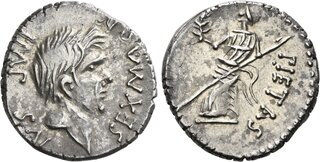| Numismatica Ars Classica > Auction 143 | Auction date: 7 May 2024 |
| Lot number: 377 Price realized: This lot is for sale in an upcoming auction - Bid on this lot  | Show similar lots on CoinArchives Find similar lots in upcoming auctions on |
| Lot description: The Dioscuri Collection. The Roman Republic. Sextus Pompeius Magnus Pius. Denarius, Southern Spain 44, AR 18 mm, 3.83 g. SEX MAGN – IMP SAL Bare head of Cnaeus Pompeius r. Rev. PIETAS Pietas standing l., holding palm branch and transverse sceptre. Babelon Pompeia 18. C 14. Sydenham 1042. Sear Imperators 232a. Woytek Arma et Nummi p. 558. Buttrey, NC 1960, type 4. RBW 1670. Crawford 477/1b. Very rare and in exceptional condition for this very difficult issue, undoubtedly among the finest specimens known. Struck on unusually fresh metal and with an interesting and unusual portrait. Extremely fine Ex Lanz 147, 2009, 223 and NAC 106, 2018, 489 sales. Sextus Pompeius was the youngest son of Pompey the Great. After his father was defeated by Julius Caesar at the Battle of Pharsalus (48 B.C.), he joined him on Lesbos before they both fled to Egypt. The young Sextus was horrified when his father stepped off the boat at Alexandria and was promptly killed. He then joined his brother Gnaeus and senators opposed to Caesar in North Africa, but when Caesar's advance showed that resistance in the region would be crushed, the brothers escaped to Hispania. There they were defeated by Caesar at the Battle of Munda (45 B.C.), marking the end of the Caesarean civil war. Gnaeus Pompeius was captured and executed for his dogged opposition, but Sextus again escaped. Moving on to Sicily, Sextus Pompeius used the island as a base for raising an army and a fleet with which to challenge the heirs of Caesar. Despite attempts by the triumvirs to evict him, Sextus remained strong in Sicily, even managing to capture Sardinia from Octavian in 40 B.C. In the following year, Sextus and the triumvirs agreed to the Pact of Misenum, which recognised his authority in Sicily, Sardinia, Corsica, and the Peloponnesus. This settlement fell apart shortly thereafter, but Sextus handily defeated a fleet commanded by Octavian at the Battle of Messina in 37 B.C. He was worsted in 36 B.C., when Octavian's admiral, Marcus Agrippa, and the triumvir Marcus Lepidus defeated him first at Mylae and then at Naulochus. With Sicily invaded and his fleet destroyed, Sextus Pompeius fled to Asia Minor, where he was hunted down and executed in 35 B.C. This early denarius of Sextus Pompeius advertises his relationship to his father in much the same way that the coins of Octavian made much of his adoptive father, Julius Caesar. For both men, their connections to their fathers were pathways to legitimacy and power. Here the portrait of the dead Pompey the Great appears on the obverse surrounded by a Latin legend that gives Sextus his father's title, Magnus ("the Great"), purposely blurring the distinction between father and son. The portrait obverse should also be read in connection with the reverse depiction of Pietas, illustrating Sextus Pompeius' filial respect and sense of duty towards the memory of his father. Estimate: 15000 CHF |  |



